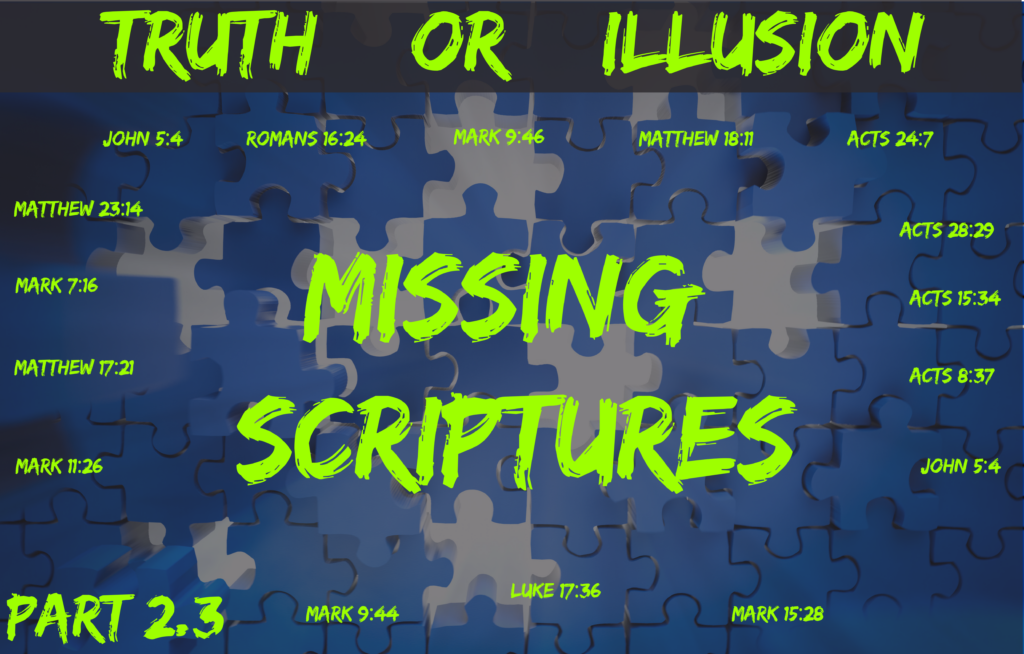
22-23 – Professing to be wise, they became foolish and CHANGED the glory of the incorruptible Elohim into the likeness of an image of a corruptible man,….
25: Who changed the truth of Elohim into a lie …
In this and all Food for Thoughts I recommend you read the Scripture(s) provided and the entire chapter they are from to obtain more insight.
Who’s changing the TRUTH Now?
While the title of this Truth or Illusion Food for Thought is “Missing Scriptures,” it is apparent that the underlying issue extends beyond the mere absence of Scriptures. Truth is often obscured by the passage of time and the actions of individuals; this instance is no different. The people from the historical eras we have been discussing and will continue to discuss were wicked, full of hatred, and motivated by misguided intentions, deceiving spirits, and doctrines of demons. These influences led to the removal, alteration, and reinterpretation of Scripture as well as the removal and exclusion of books for the spreading of lawlessness and their own selfish purposes. Additionally, they were navigating a way out of a period they termed the Dark Ages (Middle Ages) and needed to establish an identity. Unfortanly, the identity they settled on was colonizer, and their chosen religion, Christianity, played a considerable role.
Continued from last week
As we explore the history and truth, keep these words and definitions in mind:
- Hellenization: The spread of Greek culture that began after Alexander the Great’s conquest in the fourth century B.C.E.
- Renaissance: A period of European (Roman) cultural, religious, artistic, political, and economic “rebirth” following the Middle Ages. Generally described as taking place from the 14th century to the 17th century, the Renaissance promoted the rediscovery of classical philosophy, literature, and art.
- Protestant Reformation: A religious reform movement that swept through Europe in the 1500s. It resulted in the creation of a branch of Christianity called Protestantism, a name used collectively to refer to the many religious groups that separated from the Roman Catholic Church due to differences in doctrine.
History Embroiled in Hatred
Although the protestants broke free from the influence of the RCC, they continued many pagan non-biblical practices such as Sunday worship, cross/idol worship, pagan holidays, festivals, etc. Additionally, the reformers continued in their RCC historically learned hatred of the true Yahudim (Jews) and converted Jew-ISH people. Their hatred did not simply fade away. As the hatred persisted, the reformers, like the Greeks of old, sought to paint their image and ideology upon 𐤉𐤄𐤅𐤄’s Word to distance themselves further from the true Yahudim and the Elohim of what they call the Old Testament/Torah.
Note: The RCC, Renaissance, and the Protestant Reformation are also responsible for Yahusha (Jesus) and all the other Yahshar’el (Israelites) being reimaged or reimagined as caucasian or non-melanated individuals.
This cultural appropriation, brainwashing, and deception was accomplished by their version of Hellenization called the Renaissance period (1 Maccabees 3:48). Keep in mind, as we learned last week, that the true Yahudim and Yahshar’elites were being rounded up, chained, and sold as slaves through the Transatlantic Slave Trade during this period. This enslavement was authorized by the RCC Pope and carried out by Catholics, Protestant Reformers, and Protestant members. No one stopped it; in fact, the enslavement of the true Yahudim and Yahshar’elites allowed for their identities to be lost and hijacked by another group of people (Jeremiah 17:4, Rev 2:9, 3:9).
To help you understand the mindset of this movement, I’ve compiled some keywords and writings from Martin Luther and John Calvin, the main leaders of the Reformation. You can Hear, Feel, and Almost See the Hatred.
Martin Luther:
“In this treatise, he argues that Jewish synagogues and schools be set on fire, prayer books be destroyed, rabbis forbidden to preach, Jewish homes burned, and property and money confiscated. Luther demanded that no mercy or kindness be given to Jews,[3] that they be afforded no legal protection,[4] and “these poisonous envenomed worms” should be drafted into forced labor or expelled forever.[5] He also advocates murder of all Jews, writing “[W]e are at fault in not slaying them.” [6]“
“these poisonous envenomed worms should be drafted into forced labor or expelled forever.”
Martin Luther
John Calvin:
“I have had much conversation with many Jews: I have never seen either a drop of piety or a grain of truth or ingenuousness – nay, I have never found common sense in any Jew.” [43]
“David H. Price notes Calvin’s nearly unknown and posthumously published (1575) work that Calvin wrote in response to a rabbi and in which Calvin describes Jews as a “profane people, indeed, filthy dogs” (146)”.
“profane people, indeed, filthy dogs”
John Calvin
So, through the Renaissance and the Protestant Reformation, the translators aligned the translations of the Bible with their doctrines, bias, and superiority complex, just like Greek Hellenization. One would think that since this book of Scriptures was for and about Yahshar’el (Israelites), their input would be needed and valued, BUT IT WAS NOT. Over time, multiple versions and variations led to translations that are now several generations away from the original language. As a result, each translation has strayed farther from the original text, becoming more watered down and distant from the truth.
Consider This
- Did the Gentiles comprehend the full depth of Hebrew words, including formal and informal language?
- Were the Gentiles genuinely interested in understanding the Hebrews, given their hatred towards Yahshar’el and their desire to persecute and enslave them?
- Did the Gentiles want a brotherly or scholarly relationship with a people they deemed filthy dogs, void of common sense, poisonous envenomed worms, or people who don’t understand their own scriptures?

Hatred of a people in light of the topic reminds me of a wall I encountered during my recent visit to the Bahamas. This wall was adorned with Bahamian words and phrases patterned after their flag in vibrant black, aquamarine, and gold. I’m not Bahamian, so of course, I did not comprehend the meaning of many of the words and expressions. However, my affection for my Bahamian brothers and sisters sparked a curiosity within me to seek out the meanings of these phrases. Fortunately, a local Bahamian I was with did fill me in on some of them.
While I was curious to understand the meaning of some of the native terminology and cultural aspects, I must admit that I wasn’t inclined to engage fully. I thought to myself, would I even remember them, use these phrases, or need them? I told myself no and moved on.
Now, imagine if I hated and wanted to persecute Bahamians. Would I even care about their language(s)? Would I decipher all these meanings correctly without bias or agenda? Would I care to know about a people I have ordered to be persecuted, murdered, and enslaved? Obviously not! If I did care about them and their ways, I would sit down, listen, and learn, even more so if I was going to follow their Elohim, Scriptures, and beliefs. I would probably even live with or among them to learn. I most certainly would not capture, enslave, usurp, and kill them or rewrite their Holy Scriptures to my liken.
So What Bible(s) Should be Used?
Definition of Interpretation:
- The act or the result of interpreting: explanation
- A particular adaptation or version of a work, method, or style
- A teaching technique that combines factual with stimulating explanatory information
Definition of Verbatim:
- In the exact words: word for word
- being in or following the exact words: word-for-word
When accepting biblical translations from Hebrew/Aramaic to English or whatever language you read, you must obtain a verbatim copy or the closest to verbatim you can get, not an interpretation.
An interpretation can leave out or insert critical words or phrases while translating. Do you want to be misled by interpretations that have ignored, removed, or added phrases not found in the original text? Please look at the definitions of interpretation and verbatim so everything is clear as to what I am saying. We do not want an adaptation or version of a work with combined stimulating information; we need the exact word-for-word translation.
Example of the Verbatim vs Interpretation Confusion using Revelation 22:14
Original
The Peshitta Aramaic-English Interlinear New Testament

Verbatim Translations
HRB, HalleluYAH Scriptures, Cepher, KJV, BYNV
- “Blessed are the ones doing His commandments, that their authority will be over the Tree of Life, and that they may enter by the gates into the city.”
Interpretation Translations
ESV, NIV, NASB, Message, CSB, NLT and many Bibles read:
- “Blessed are those who wash their robes, so that they may have the right to the tree of life and that they may enter the city by the gates.“
Although there is no perfect translation, please take care when choosing a Bible to study with. As BBBs (Bible Believing Believers), we should be mindful of paraphrased, thought-for-thought, and gender-neutral and inclusive Bibles like the NIV, NLT, Message Bible, etc., as they can reflect the opinions and religious beliefs of the person(s) and not the true intent or spirit of the Word of 𐤉𐤄𐤅𐤄.
I primarily use the following Bibles. However, none of these Bibles conclude who the true Yahshar’el (Israelites) are.
- HRB – Hebraic Roots Bible (PDF) – Free downloads available. They do not charge for a hard copy of the Bible. However, they ask for a $35 donation to help print more Bibles for others who can’t afford one.
- The Peshitta Aramaic-English New Testament An Interlinear Translation Online
- HalleluYAH Scriptures – Free standard edition for those who cannot afford one.
- Cepher
- BYNV – Besorah of Yahusha Natsarim Version
Conclusion
𐤉𐤄𐤅𐤄 has instructed us in Duet 4:12, Proverbs 30:5–6, and Rev 22:18–19 that we are not to add, supplement, take away, or diminish His Word. 𐤉𐤄𐤅𐤄’s Word must not be polluted, corrupted, or subjected to human traditions, opinions, and agendas. We must not change the meaning of the text by deleting and adding phrases and passages or removing books. We must not knowingly misrepresent, change, or falsify what is in the original text. As Yahshar’el and BBBs, we must submit to the Word of 𐤉𐤄𐤅𐤄 and allow it to fully live within us richly (Colossians 3:16) so that it might instruct, reproof, correct, and train us in righteousness so that we might be perfected. (2 Timothy 3:16–17). Lastly, we must not stand with or accept others who do these abominable things.
By: David Edwards – HalleluYAH – Praise YAH – Praise 𐤉𐤄𐤅𐤄

